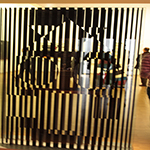Euroacademia Conferences
 Europe Inside-Out: Europe and Europeanness Exposed to Plural Observers (9th Edition) April 24 - 25, 2020
Europe Inside-Out: Europe and Europeanness Exposed to Plural Observers (9th Edition) April 24 - 25, 2020 Identities and Identifications: Politicized Uses of Collective Identities (9th Edition) June 12 - 13, 2020
Identities and Identifications: Politicized Uses of Collective Identities (9th Edition) June 12 - 13, 2020 8th Forum of Critical Studies: Asking Big Questions Again January 24 - 25, 2020
8th Forum of Critical Studies: Asking Big Questions Again January 24 - 25, 2020 Re-Inventing Eastern Europe (7th Edition) December 13 - 14, 2019
Re-Inventing Eastern Europe (7th Edition) December 13 - 14, 2019 The European Union and the Politicization of Europe (8th Edition) October 25 - 26, 2019
The European Union and the Politicization of Europe (8th Edition) October 25 - 26, 2019 Identities and Identifications: Politicized Uses of Collective Identities (8th Edition) June 28 - 29, 2019
Identities and Identifications: Politicized Uses of Collective Identities (8th Edition) June 28 - 29, 2019 The European Union and the Politicization of Europe (7th Edition) January 25 - 26, 2019
The European Union and the Politicization of Europe (7th Edition) January 25 - 26, 2019 7th Forum of Critical Studies: Asking Big Questions Again November 23 - 24, 2018
7th Forum of Critical Studies: Asking Big Questions Again November 23 - 24, 2018 Europe Inside-Out: Europe and Europeanness Exposed to Plural Observers (8th Edition) September 28 - 30, 2018
Europe Inside-Out: Europe and Europeanness Exposed to Plural Observers (8th Edition) September 28 - 30, 2018 Identities and Identifications: Politicized Uses of Collective Identities (7th Edition) June 14 - 15, 2018
Identities and Identifications: Politicized Uses of Collective Identities (7th Edition) June 14 - 15, 2018
Turkey: The Inveterate Candidate
-
-

-
Presentation speakers
- Alaaddin F. Paksoy, Anadolu University, Eskişehir, Turkey
Abstract:
Turkey is the only inveterate EU membership candidate. No country has waited at the front door of the EU as long as Turkey yet. There are different reasons behind this and they make the issue interesting to contemplate. Turkey’s most recent failed attempt to become a member of the European Union in the first decade of this century occasioned a great deal of soul searching and comment amongst European intellectuals, media commentators and political actors. It opened up a whole series of discussions about what it meant to be European and about the nature of the essence of the European Union and the idea of a united Europe. It also occasioned much reflection on the historical relations – and boundaries – between Europe/ the West and the Ottoman Empire / Turkey / the East. Whilst all these discussions were challenging and valuable in highlighting complex issues of identity and place – Who is European? Where is Europe? Who is not European, and so on – there were some other areas of enquiry that set off different concerns. One of these was the very different perspectives or approaches to the subject of Turkey’s accession that could be found amongst different members of the European Union. So, for example, there were some differences between the ways in which the British political establishment, including the media, looked at the question of accession and the French or German establishment. Although all, in one way or another, sought to place the discussion within the context of a wider discussion about the EU’s future identity and the rationale of European integration (Beck & Delanty, 2006, p. 11; Tekin, 2008; Aksoy, 2009; Wimmel, 2009; Kylstad, 2010; Papathanassopoulos & Negrine, 2011), at base the discussion was about the nature of Europe and of Turkey as the ’other’. In addition to Turkey’s different status compared to the EU membership candidacy processes of other countries, there is also an awkward relationship between the EU and the UK, and inevitably the British media. Therefore, this study seeks to present an analytical framework which draws on the notion of ’a positive Other’ while explaining the representation of Turkey’s EU bid in the British media. The paper discusses the inadequacy of Orientalism and Self/Other nexus to understand the context in the British coverage and highlights the ’essentialist’ and ’functionalist’ approaches in its attempt to explain the differences within the EU in exploring the fundamentals of the EU and the view about Turkish membership. The study seeks to explore how Turkey’s EU bid was represented in the British media by focusing on one main research question, namely, ’How was Turkey’s EU bid represented in the British media?’ In order to answer this question the study looks at the coverage of different important periods in Turkey-EU relations between 1999 and 2006. The news items published in these periods by six news organizations from the British media will be analyzed by using quantitative and qualitative content analysis.
-
Related Presentations

’Supranationalization’ of CFSP – Wishful Thinking or Rational Choice to Face the ’Hybrid’ Challenges?
- Oleksandr Moskalenko

The Issue of Legitimacy - EU Action in Selected Policy Areas
- Kyriakos Revelas
















